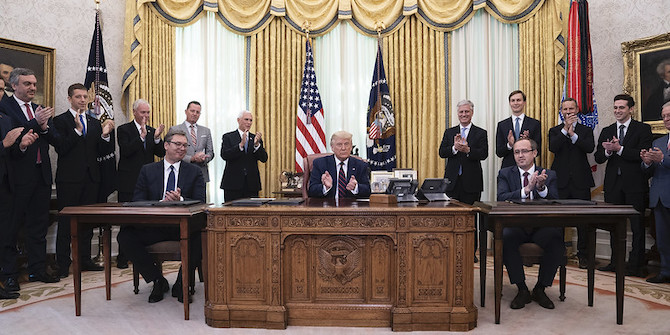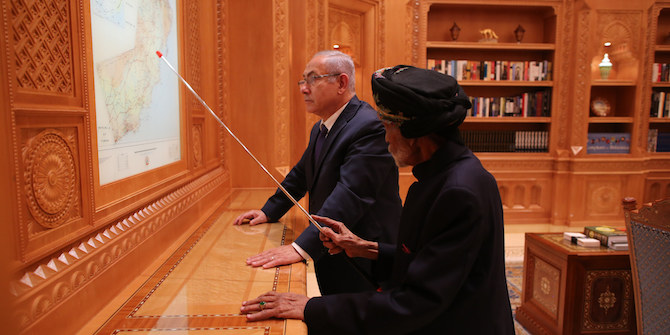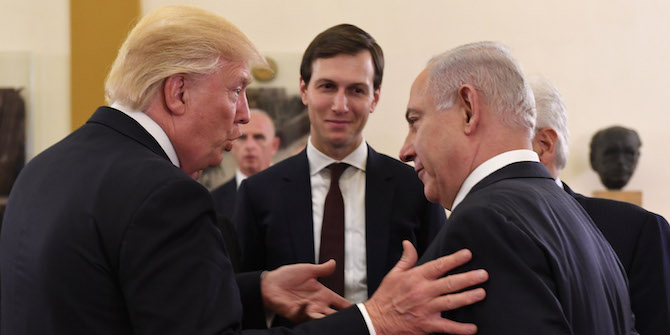by Vuk Vuksanovic

In September 2020, under the mediation of then US President Donald Trump, Serbia and Kosovo signed an economic normalisation agreement at the White House. In his failed bid for re-election, Donald Trump inserted into the agreement provisions that were popular with his supporters but had nothing to do with the territorial dispute in the Balkans. One of the agreement’s provisions was that Kosovo and Israel would recognise each other, with Kosovo opening its embassy in Jerusalem and Serbia moving its embassy from Tel Aviv to Jerusalem. Trump is gone, but the challenges posed by moving the embassy to Jerusalem continue to haunt Serbian foreign policy, with several painful dilemmas for Belgrade.
In May 2021, Israel’s Ambassador to Serbia, Yahel Vilan, raised hackles in Belgrade when he said that Israel did recognise Kosovo but noted that it was done under an agreement mediated by the US and signed by Serbia and Kosovo. This was perceived as Ambassador Vilan implying that Serbia de facto recognised Kosovo. Serbian Foreign Minister Nikola Selaković dismissed Vilan’s statement and noted that, as a result, Serbia is unlikely to move its embassy to Jerusalem. However, Serbian foreign policy is faced with several ‘damned if you do and damned if you don’t’ choices despite these statements.
If Serbia moves the embassy to Jerusalem, it complicates its relationship with the Islamic world. Unlike socialist Yugoslavia, which as a leader in the Non-Aligned Movement severed diplomatic ties over the Six-Day War in 1967, Serbia prides itself on being on friendly terms with Palestinians and Israelis. The Palestinian Ambassador to Serbia has urged his hosts not to move the embassy to Jerusalem. Turkey, a major partner of Serbia, was so irked by the Washington Agreement that it prompted a signatory, Serbian President Aleksandar Vučić, to meet his Turkish counterpart Recep Tayyip Erdoğan in Istanbul in September 2020 to mend ties. There is also Iran. In April 2021, Foreign Minister Selaković visited Tehran to ensure that Iran remains a non-recogniser of independent Kosovo. A relationship with Iran is even more sensitive for Serbia. The Washington Agreement involved Belgrade designating Hezbollah, an Iranian proxy in Lebanon, as a terrorist organisation, increasing security risks for Serbian peacekeepers in the UN Mission in Lebanon.
However, if Serbia does not move its embassy, it might appear that it is siding with the positions of other regional powers such as Iran and Turkey. It is worth remembering that before the Washington Agreement, Israel and the UAE established diplomatic relations and cemented their alliance against Iran and Turkey. In recent years the UAE has emerged as Serbia’s main partner in the Arab world and fourth-largest foreign investor. By signing the Washington Agreement, Serbia inadvertently found itself amidst messy diplomatic faultlines in the Middle East. For these regional blocs, the Palestinian issue remains divisive, particularly in light of the recent Israeli-Palestinian conflict in Gaza, putting further pressure on Belgrade regarding the embassy move.
There is also the issue of Serbian ties with the US. One of the reasons Serbia was willing to accept having Israel recognise Kosovo and move its embassy to Jerusalem was to gain access to the Trump administration and try to build a partnership with the US, something that Belgrade has desired but failed to achieve in decades. However, the bet on Trump failed, and now Belgrade has to cope with a Biden administration that is expected to be tougher on the Serbian government, including on the Kosovo dispute. To manage their relations with the new US administration, the Serbian leadership is constantly stressing their hope that Joe Biden will build upon the momentum set by Trump in US-Serbian ties. This approach is sound but comes with a catch. If one wants to build upon such momentum, one has to obey the agreements reached with the former administration, including less palatable clauses including the embassy move. While the Washington Agreement is not legally binding, a document signed in the Oval Office has political weight. Therefore, not abiding by all of its provisions risks adding another complication to ties with the US.
There is also the issue of the Israeli lobby. Getting access to the White House and securing the protection of pro-Israeli interest groups was also a major reason for Serbia signing the agreement. In March 2020, President Vučić spoke at the annual conference of the American Israel Public Affairs Committee (AIPAC), an influential pro-Israeli lobby organisation. Now, Vučić might be tempted to use the protection of the Israel lobby to ameliorate potential pressures from the Biden administration. The question remains whether this will suffice for Vučić to move the embassy to Jerusalem, particularly as stances towards Israel are more mixed among Democrats than Republicans. However, if Vučić does not follow through on the embassy move, he risks the animosity of the Israel lobby in Washington.
How will Serbia proceed? It will kick the can down the road. With Kosovo opening an embassy in Jerusalem, beyond doubt complicating Pristina’s ties with the Islamic world; Serbia will postpone the embassy move to keep Kosovo on the defensive in the Muslim world and prevent new recognitions of Kosovo’ independence. Serbia will keep an eye on the current state of the Israeli-Palestinian conflict and how the Biden administration asserts itself. Moreover, as Israel is now forming a new government, with Yair Lapid – set to take over as prime minister down the line – having his family origins in Novi Sad in Serbia, Belgrade might use this and the uncertainty generated by transition politics to try to avoid the embassy move. It remains to be seen how events will transpire, but it appears certain that in agreeing to the embassy move, the Serbian leadership bit off more than it could chew.





